

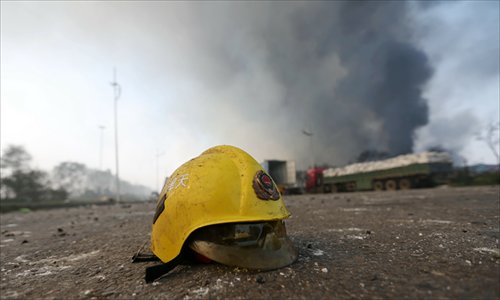 |
Public outcry over proximity of warehouse, environmental evaluation
The explosions in Tianjin may have raised questions over loopholes in the logistics company's safety precautions and the warehouse's location.
While Tianjin authorities on Thursday said an investigation into the cause of the explosions is still under investigation, media have reported on questionable practices that may have worsened the disaster, including the company's previous environmental impact assessment, the warehouse's proximity to homes and Tianjin's city planning.
"It is too early to determine the reasons for the explosions as details on the exact content and amount of materials stored have not been released by the authorities," Wang Gengchen, a research fellow from the Institute of Atmospheric Physics at the Chinese Academy of Sciences, told the Global Times.
Residents living 500 to 2,000 meters from the area told a Global Times reporter at a Tianjin hospital that they were not aware of dangerous chemicals in the warehouse, and did not receive any warnings when they bought their apartment.
"We thought it was a small fire in an ordinary warehouse when the blasts took place, and we did not pay much attention at first," a resident told the Global Times.
Chinese law for businesses involving dangerous chemicals states that storing such materials should be at least 1,000 meters from public buildings and transport networks. But the developer's data shows there are three major residential communities within 1 kilometer of the warehouse.
An environmental impact assessment report obtained by sina.com.cn shows that Tianjin Dongjiang Port Ruihai International Logistics, a company that handles hazardous materials, turned the over 46,000-square-meter warehouse into a storage facility for dangerous chemicals.
The report said that any leakage of chemicals or fire accidents will not cause a "major impact" on the surrounding area or people if appropriate measures will be taken.
A loader working for the company said he was not trained to handle dangerous chemicals before the explosions, reported China National Radio.
An anonymous insider involved in Tianjin's urban planning said that Tianjin in recent years has overdeveloped the chemical industry, which deviates from its original plan, reported National Business Daily.
Ruihai, established in 2011, boasts of over 30 million yuan ($4.69 million) in annual revenue and handles a million tons of cargo every year. It was involved in compressed and liquefied gas (argon and liquefied natural gas), flammable liquids (methyl ethyl ketone, ethyl acetate), flammable solids and matter that would explode when coming in contact with water (sulphur, nitrocellulose, calcium carbide and calcium-silicon) and toxic articles (sodium cyanide).
Sodium cyanide found in drains
The Beijing News reported that a factory owner said there were at least 700 tons of sodium cyanide stored in the warehouse, and traces of sodium cyanide were found in nearby drains after the blasts.
However, a chemical squad from the People's Armed Police did not find cyanide compounds 500 meters from the fire places, according to Xinhua.
"The level of six chemicals in the five monitoring stations has not significantly risen, and is consistent with other parts of the city," Wen Wurui, head of the Tianjin Environmental Protection Bureau, said at a press conference on Thursday.
The six chemicals are sulfur dioxide, carbon monoxide, nitrogen oxides, epoxyethane, methylbenzene and volatile organic compounds.
At 4 pm, police detected high levels of toxic gas, including sulfur dioxide, carbon monoxide and nitrogen oxide, within 500 meters of the fire, according to the rescue headquarters. But they were not detected 2 kilometers from the fire, officials said.
Tianjin environmental bureau said all harmful gas indicators had returned to normal as of Thursday from the 17 air quality monitoring stations near the warehouse destroyed by Wednesday night's explosions.
"Since the wind is blowing northeast in Tianjin toward the Bohai Sea, we believe the fumes will not reach Beijing," said Wen, Tianjin's environment head.
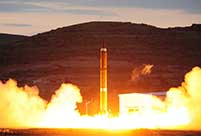 Striking moments when strategic missiles are launched
Striking moments when strategic missiles are launched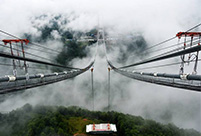 Construction on Asia’s biggest suspension bridge started
Construction on Asia’s biggest suspension bridge started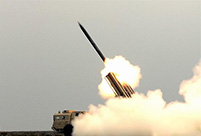 Impressive firing of China’s rocket artillery system
Impressive firing of China’s rocket artillery system Shocking scenes found in 4000-year-old earthquake relic
Shocking scenes found in 4000-year-old earthquake relic Female soldiers add color to military parades
Female soldiers add color to military parades Mums stage breastfeeding flash mob
Mums stage breastfeeding flash mob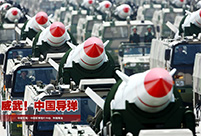 Awesome Chinese missiles
Awesome Chinese missiles Official shot having sex with two college girls
Official shot having sex with two college girls Moscow “spider-man” climbs Chinese skyscraper
Moscow “spider-man” climbs Chinese skyscraper Keeping cool in ancient China
Keeping cool in ancient China Tianjin explosion: Latest updates
Tianjin explosion: Latest updates Hyping threat of yuan devaluation absurd
Hyping threat of yuan devaluation absurd Warehouse explodes near Tianjin’s port, 44 killed, over 400 injured
Warehouse explodes near Tianjin’s port, 44 killed, over 400 injuredDay|Week